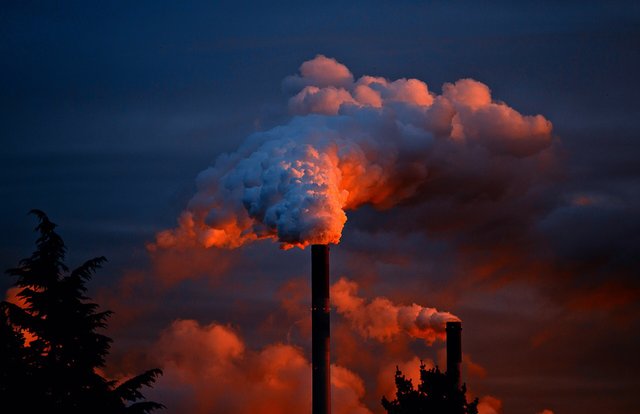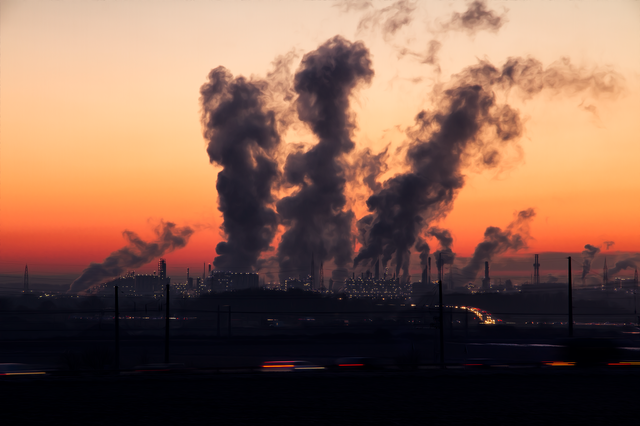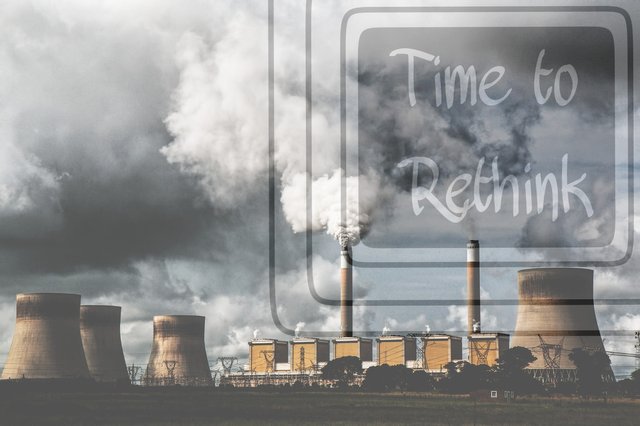Inquinamento Atmosferico, cause e conseguenze - Air pollution, causes and consequences (ITA-ENG)

ITA 🇮🇹
Buonasera Amici ed utenti di STEEMIT!
Quest’oggi voglio discutere insieme a voi di uno dei più grandi (se non il maggiore) problemi che affliggono l’umanità, l’inquinamento atmosferico. Giornalmente sentiamo parlare di riduzione dei gas tossici, protocolli governativi per ridurre l’inquinamento, malattie che provocano le polveri sottili, superamenti di soglie limite, ma che cosa è e quali sono le cause e le conseguenze di questo problema?
L’inquinamento atmosferico si definisce come uno stato di alterazione delle condizioni naturali dell’aria e può esser causato da diversi fattori, l’immissione nell’aria di sostanze chimiche e gassose che modificano la struttura e la composizione naturale dell’atmosfera terrestre. A produrre queste modifiche le cause possono essere naturali, o generate dall’attività dell’uomo. In caso di eruzioni vulcaniche, per esempio, abbiamo l’immissione nell’aria di tantissime sostanze inquinanti, anche se la causa è praticamente naturale. Purtroppo però un impatto maggiore sulla qualità dell’aria è dato dall’attività umana. Gas di scarico di autoveicoli, caldaie, centrali elettriche, fabbriche, impianti di incenerimento vengono emessi nella nostra atmosfera sotto forma di sostanze nocive e particolarmente dannose per la salute di tutto il pianeta, sia animale che vegetale.
ENG 🇬🇧
Good evening Friends and users of STEEMIT!
Today I want to discuss with you one of the biggest (if not the greatest) problems that afflict humanity, air pollution. Every day we hear about toxic gas reductions, government protocols to reduce pollution, diseases that cause fine dust, exceed threshold limits, but what is it and what are the causes and consequences of this problem?
Air pollution is defined as a state of alteration of the natural conditions of the air and can be caused by various factors, the introduction into the air of chemical and gaseous substances that modify the structure and natural composition of the earth's atmosphere. To produce these changes the causes can be natural, or generated by human activity. In the case of volcanic eruptions, for example, we have a lot of pollutants entering the air, even if the cause is practically natural. Unfortunately, however, a greater impact on air quality is given by human activity. Exhaust gases from motor vehicles, boilers, power plants, factories and incineration plants are emitted into our atmosphere in the form of harmful substances that are particularly harmful to the health of the entire planet, both animal and plant.

Foto di Ralf Vetterle da Pixabay
ITA 🇮🇹
Esistono in materia numerosi metodi di classificazione degli agenti chimici e gassosi dispersi nell’aria, classificati in base alla composizione chimica, ma vediamo le principali
composti dello zolfo (SO2);
composti dell’azoto (NOx);
composti del carbonio (CO);
IPA idrocarburi policiclici aromatici (prodotti nella combustione della legna, nafta e gasolio).
Le sostanze che derivano da fonti naturali sono ad esempio le eruzioni vulcaniche (SO2), fonti incendiarie (PM10) oppure dalla decomposizione di composti organici (allergeni).
Inquinamento dell’aria: cause
Le principali cause dell’inquinamento dell’aria sono dovute alle attività umane. I trasporti è una delle maggiori attività dell’uomo con la quale produce alti livelli di smog nell’aria. L’inquinamento proveniente dalle auto dipende molto dal tipo di combustibile utilizzato:
autoveicoli a benzina producono emissioni di anidride carbonica (CO2) e NOx;
autoveicoli a metano e GPL producono principalmente particolato (PM10), idrocarburi(HC), ossidi di azoto (NOx), biossido di zolfo (SO2).
Le cause dell’inquinamento dell’aria non finiscono qui oltre al settore dei veicoli ci sono diverse attività “umane “ che aumentano l’emissione di gas tossici.
Il riscaldamento domestico ad esempio, le nostre caldaie per tenere la nostra casa al caldo, utilizzano dei combustibili che a seconda della loro tipologia emettono particolari sostanze gassose dannose.
Agenti inquinanti vengono prodotti anche dal settore dell’agricoltura e dal trattamento dei rifiuti urbani.
L’elettricità, che molto spesso viene generata bruciando dei combustibili fossili.
Per non parlare del settore dell’industria dal quale provengono ingenti quantità di solventi, nebbie acide, metalli pesanti e polveri rilasciate dalla lavorazione delle macchine. Pensando a questo mi salta subito in mente la città di Taranto in Puglia. L’ILVA (la principale acciaieria della città) e tutte le industrie pesanti presenti nei pressi della città, rendono l’aria letteralmente irrespirabile.
ENG🇬🇧
There are numerous methods of classification of chemical and gaseous agents dispersed in the air, classified according to chemical composition, but we see the main ones
• sulfur compounds (SO2);
• nitrogen compounds (NOx);
• carbon compounds (CO);
• IPA polycyclic aromatic hydrocarbons (produced in the combustion of wood, naphtha and gas oil).
The substances that derive from natural sources are for example volcanic eruptions (SO2), incendiary sources (PM10) or from the decomposition of organic compounds (allergens).
Air pollution: causes
The main causes of air pollution are due to human activities. Transport is one of the major activities of man with which he produces high levels of smog in the air. The pollution coming from cars depends very much on the type of fuel used:
• petrol-powered vehicles produce carbon dioxide (CO2) and NOx emissions;
• natural gas and LPG vehicles mainly produce particulate matter (PM10), hydrocarbons (HC), nitrogen oxides (NOx), sulfur dioxide (SO2).
The causes of air pollution do not end there. In addition to the vehicle sector, there are several "human" activities that increase the emission of toxic gases.
Domestic heating, for example, our boilers to keep our home warm, use fuels that emit particular harmful gaseous substances according to their type.
Polluting agents are also produced by the agriculture sector and by the treatment of urban waste.
Electricity, which is very often generated by burning fossil fuels.
Not to mention the industry sector from which large quantities of solvents, acid mists, heavy metals and dust released by machine processing originate. Thinking of this, the city of Taranto in Puglia immediately springs to mind. The ILVA (the main steelworks of the city) and all the heavy industries near the city, make the air literally unbearable.

Foto di Alexas_Fotos da Pixabay
ITA🇮🇹
Quali sono le conseguenze di questo inquinamento atmosferico? Senza ombra di dubbio ci sono delle grave ripercussioni sulla salute umana, a seconda della gravità dell’impatto delle esposizioni prolungate e di picco a questi inquinanti, l’uomo può accusare varie malattie che variano dall’indebolimento del sistema respiratorio fino alla morte prematura. Circa il 90 % degli abitanti delle città è esposto a concentrazioni di inquinanti superiori ai livelli di qualità dell’aria ritenuti dannosi per la salute. Sempre più spesso sentiamo parlare di superamento della soglia di polvere sottili in questa o quella città, o di un particolare concentrazione di inquinamento da smog in una certa area, con conseguenti blocco del traffico, circolazione con targhe alterne e provvedimenti simili. Per quanto invisibile, quindi, l’inquinamento atmosferico esiste e ha effetti sulla nostra vita di tutti i giorni e anche sulla nostra salute.
L’effetto dell’inquinamento atmosferico è però globale, si ripercuote anche sull’ambiente e sulla salute del nostro caro pianeta Terra. In particolare, sono tre le conseguenze effetto serra, buco nell’ozono e piogge acide.
L’effetto serra ,semplificato in poche parole, costringe il pianeta a trattenere più calore dalla luce solare di quanto naturalmente avverrebbe. Questo fenomeno, nel lungo periodo, porta a un innalzamento delle temperature del pianeta, con conseguente aumento del livello del mare e problemi di desertificazione e di cambiamento rapidissimo della flora e della fauna di tutto il pianeta. Il buco dell’ozono, invece, provoca la riduzione della naturale protezione che abbiamo contro i raggi UV del sole, rendendo la luce solare potenzialmente dannosa per la nostra pelle. Infine, le piogge acide sono dovute alla presenza di zolfo e azoto in eccesso nell’atmosfera, che finiscono nel terreno e sulle piante. Questi fenomeni riducono enormemente la fertilità della terra e la qualità dei prodotti dell’agricoltura.
Combattere l’inquinamento atmosferico non è impossibile, anzi è probabilmente una scelta obbligata se vogliamo tenere il nostro pianeta in una condizione ottimale per la nostra vita. Per farlo, bisogna adoperare tutta una serie di comportamenti. Nel breve periodo dovremo cominciare a rinunciare sempre di più all’automobile e optare per il trasporto pubblico. In alternativa, se proprio abbiamo bisogno dell’auto, dovremo usare quelle di ultima generazione, meno inquinanti, oppure rivolgerci ai sempre più diffusi servizi di car sharing che ci permettono di avere un’auto solo quando ci serve e a costi contenuti.
Fare attenzione quando si fa spesa: preferire le confezioni con meno imballaggi, per esempio detersivi o altro senza astuccio di cartone, maionese idem, maxi taglie per bagnoschiuma e shampoo che hanno meno imballo in proporzione al contenuto, usare saponette al posto dei saponi liquidi. Per fare la spesa, usare le borse di cotone riutilizzabili. Infine, colorare di verde l’ambiente circostante con piante: sono infatti in grado di rimuovere grandissime quantità di alcuni dei principali inquinanti gassosi (CO2, NOx, CO, SO2, O3, ecc.) e le polveri inalabili.
Piccoli Gesti che possono migliorare la salute sia umana sia del nostro pianeta. Ricordiamoci che adottare questi piccoli accorgimenti non è solo utile ed importante per noi, ma è FONDAMENTALE per i nostri figli, i nostri nipoti e le generazioni future che purtroppo saranno costretti a vivere in un mondo sempre più inquinato e malsano.
ENG 🇬🇧
What are the consequences of this air pollution? Without a shadow of a doubt there are serious repercussions on human health, depending on the severity of the impact of prolonged and peak exposures to these pollutants, humans can experience various diseases ranging from weakening of the respiratory system to premature death. About 90% of city dwellers are exposed to concentrations of pollutants above the levels of air quality considered harmful to health. More and more often we hear of the overcoming of the fine dust threshold in this or that city, or of a particular concentration of smog pollution in a certain area, with consequent traffic block, circulation with alternate plates and similar measures. As invisible, therefore, air pollution exists and has effects on our everyday life and also on our health.
However, the effect of air pollution is global, also affecting the environment and the health of our dear planet Earth. In particular, there are three consequences of the greenhouse effect, ozone hole and acid rain.
The greenhouse effect, simplified in a few words, forces the planet to retain more heat from the sunlight than would naturally occur. This phenomenon, in the long run, leads to an increase in the planet's temperatures, with a consequent increase in sea levels and problems of desertification and rapid change in the flora and fauna of the entire planet. The ozone hole, on the other hand, causes the reduction of the natural protection we have against the UV rays of the sun, making sunlight potentially harmful to our skin. Finally, acid rain is due to the presence of sulfur and excess nitrogen in the atmosphere, which end up in the ground and on the plants. These phenomena greatly reduce the fertility of the earth and the quality of agricultural products.
Fighting air pollution is not impossible, indeed it is probably an obligatory choice if we want to keep our planet in an optimal condition for our life. To do this, a series of behaviors must be used. In the short term we will have to begin to give up more and more on the car and opt for public transport. Alternatively, if we really need the car, we will have to use the last generation, less polluting ones, or turn to the increasingly widespread car sharing services that allow us to have a car only when we need it and at low cost.
Be careful when shopping: prefer packaging with less packaging, such as detergents or other items without carton, ditto mayonnaise, maxi sizes for bubble bath and shampoo that have less packaging in proportion to the contents, use soap instead of liquid soaps. To do the shopping, use reusable cotton bags. Finally, coloring the surrounding environment with plants: they are able to remove very large quantities of some of the main gaseous pollutants (CO2, NOx, CO, SO2, O3, etc.) and inhalable dusts.
Small Gestures that can improve both human health and our planet's health. Let us remember that adopting these small tricks is not only useful and important for us, but it is FUNDAMENTAL for our children, our grandchildren and future generations who unfortunately will be forced to live in an increasingly polluted and unhealthy world.
Fonte: https://www.teamworld.it/lifestyle/inquinamento-atmosferico/
Fonte: http://www.risparmio-energetico.com/Inquinamento-dell-aria-cause.html
Posted using Partiko iOS
Thank you so much for being an awesome Partiko user! You have received a 54.15% upvote from us for your 11211 Partiko Points! Together, let's change the world!
Congratulations! This post has been upvoted from the communal account, @minnowsupport, by Clamon from the Minnow Support Project. It's a witness project run by aggroed, ausbitbank, teamsteem, someguy123, neoxian, followbtcnews, and netuoso. The goal is to help Steemit grow by supporting Minnows. Please find us at the Peace, Abundance, and Liberty Network (PALnet) Discord Channel. It's a completely public and open space to all members of the Steemit community who voluntarily choose to be there.
If you would like to delegate to the Minnow Support Project you can do so by clicking on the following links: 50SP, 100SP, 250SP, 500SP, 1000SP, 5000SP.
Be sure to leave at least 50SP undelegated on your account.
Congratulations to @clamon for the very interesting and comprehensive post on a subject that we feel particularly.
We encourage users to support our Green project.
Congratulazioni a @clamon per il post molto interessante ed esaustivo su un tema che sentiamo particolarmente.
Invitiamo gli utenti a supportare il nostro progetto Green.
The CooperFelix - Multiservices invites the users to take a look at the objectives of the project, hoping for your participation THE CF-M Project on Fundition